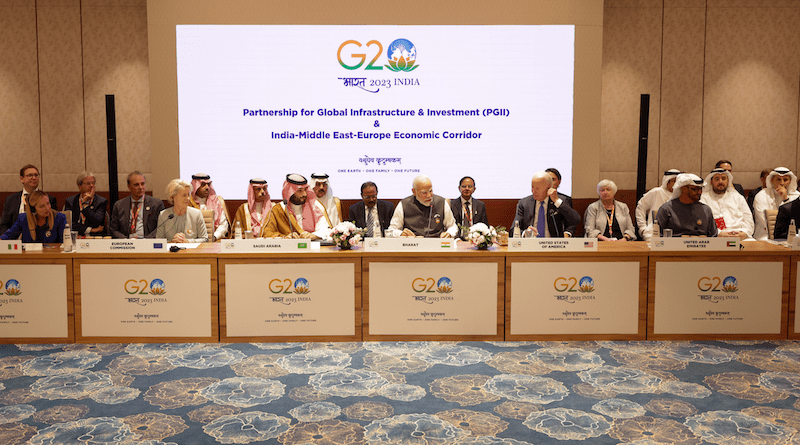Middle East Conflict: Consequences For The Proposed IMEC – OpEd
By Ali Hamza
On the 7th of October, an ordinary Saturday morning, no one had expected that the whole region was standing at another human catastrophe. The Izz ad-Din al-Qassam Brigades, the military wing of Hamas, initiated their offensive against Israeli forces surprisingly, by firing thousands of rockets on Israeli settlements and cities. Hamas also took dozens of Israelis hostage in their operation “Al-Aqsa Storm.” Not only Israel but the whole world was surprised by the intensity and scope of the operation. The world also knew what was coming next.
As Israel began to respond, Gaza turned into a massive graveyard. Israel’s counteroffensive has turned into a widespread carnage in the area. The world has not condoned the Israeli action as it has resulted in a humanitarian crisis. There have been widespread calls for an immediate ceasefire, but Israel, backed by the United States, has not budged. The new surge of violence in the region will have regional and global repercussions. It will stall the reconciliatory projects in the Middle East and will delay any thaw in the relations between the Arabs and Israel.
Another very important effect the crisis has had is the little or no progress on the India-Middle East Europe Economic Corridor. IMEC was announced this year in New Delhi on the sidelines of the eighteenth meeting of G20 (Group of Twenty). IMEC is an infrastructure development project that aims to create connectivity through rail and shipping networks, energy cables, and data links. It was dubbed as a “game-changer” for the world by its proponents, while it also received considerable criticism. Since its announcement in September, no visible progress has been made except widespread speculations about the issue.
The proposed corridor aims to connect the Indian port city of Gujrat to the Middle East and then will go on to connect Europe with the Middle East. Based on the available roadmap, it was already being argued that this corridor is more “Middle East-centric” than “India-centric.” Most prominently, Saudi Arabia has emerged as an effective international player. Speculations about the establishment of diplomatic relations between Saudi Arabia and Israel, and the proposition of a corridor at the center of which Saudi Arabia lies, implied that Saudi Arabia has a very important role to play. The trajectory of all this was changed by the resurgence of high-scale violence between Israel and Hamas.
Already bombarded with speculations about its practicality and efficacy, the India-Middle East Europe Economic Corridor has lost all its appeal for discussion in the media and academia. A corridor cannot be built in a region so rife with violence and conflicts. The corridor, completely backed by the United States, was clearly an attempt to bring the Arab states, particularly Saudia Arabia, closer to the United States’ allies in the region. Moreover, it was also a response to the Chinese-supported reconciliation process between Iran and Saudi Arabia. Israel’s indiscriminate bombing of Gaza, brutally massacring civilians, and showing complete disregard for all international obligations have made any quick reconciliation between Arab states and Israel impossible.
The building of trade routes is a mutually beneficial activity that requires a positive-sum game approach by the parties involved. The United States and its “Cold War” mentality to deal with the crises of the twenty-first century has already proved to be “outdated.” Hence, those who argued that a US-backed corridor was not going to be practical, have been proved to be right. Supporting Israel in its belligerence against unarmed Gazans on the one hand, and proposing mutually beneficial economic partnerships on the other, is not commensurate with the basic idea of economic integration. Sustainable peace is the first step towards achieving a platform on which the edifice of mutually beneficial economic and trade partnerships can be built. The current trajectory leads to peace nowhere and will be highly detrimental to the process of economic integration.
IMEC has been pushed to the corner by Israel’s disregard for any international outcry. Its actions have pushed the Middle East towards chaos again. The circumstances are not conducive for any corridor to be built and trade to be done. If the United States wants to lead the world in the current times, it will have to adopt a different approach than the Cold War. The world does not buy the “camp politics” approach anymore. Mutually beneficial partnerships will require a higher level of trust and it will certainly need a more responsible international demeanor instead of supporting the massacre of civilians.


The US doesn’t seem to have any goal beyond slavish support of Israel, even if it means aiding and abetting in war crimes and crimes against humanity. It’s remarkably shortsighted and fails to further any goals that would be beneficial to the region, the US, and even Israel in the long run. The world is watching the slaughter of innocent civilians, almost half of whom are children including premature infants in incubators. It clearly shows that neither Israel nor the US values the lives of non white civilians. How could this total lack of respect for human lives (unless they’re white europeans) encourage any non western country to seek an alliance? Netanyahu and Biden aren’t leaders for the 21st century, both ascribing to a belief in their inherent superiority to “others”. They are both still living in the colonial period of the last century. Showing a total disregard for international law holds no promise that they would abide by either the letter or the intent of any agreement. They appear only concerned for their own political futures (Biden seeking campaign financing from Israel and Netanyahu hoping to distract from his abject failures on 10/7 by offering his base the bloodletting they demand as well as the thinly veiled promise of ethnic cleansing and genocide) with a total lack of concern for human life, their own success at any cost.